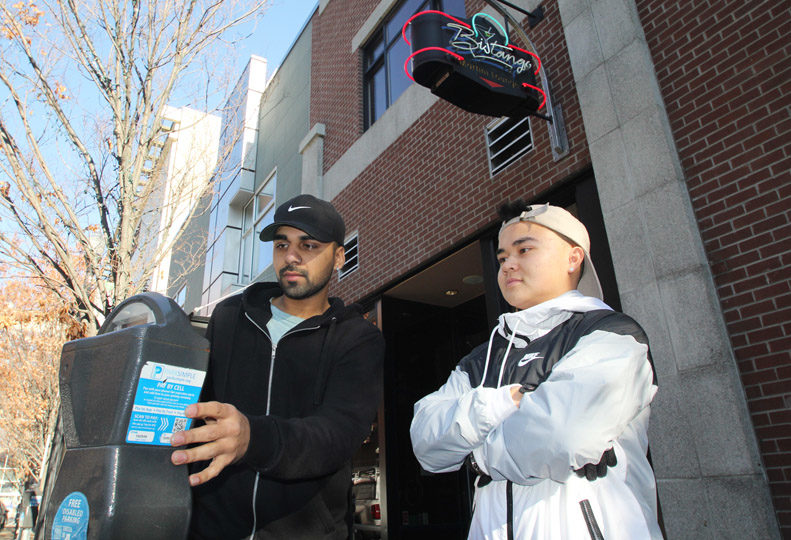
Home » Downtown Spokane Partnership, city to curb meter feeders
Downtown Spokane Partnership, city to curb meter feeders
City Council wants to free street parking for shoppers

November 17, 2016
The city of Spokane and the Downtown Spokane Partnership want to get meter feeders off downtown’s core streets and create more room for shoppers and visitors in the city’s center.
The Spokane City Council has directed the city’s Parking Services Department to begin using parking meter-reader technology giving downtown parking enforcement officers a more rigorous tool to enforce two-hour time limits.
Andrew Rolwes, parking manager for the Downtown Spokane Partnership, says enforcement officers now will collect more comprehensive data to gauge how widespread “meter feeding” is by downtown employees.
An estimated 40 percent of parking meters in the city’s core are occupied by downtown workers. Rolwes says it’s more cost effective for city workers to pay for monthly parking than to meter feed.
Central downtown meters cost $2.40 for two hours, which means a 40-hour work week of plugging a two-hour meter is going to cost a downtown worker $192 per month.
“There’s a wide range of prices at a number of lots and garages downtown,” says Rolwes, who notes that he pays $65 per month for downtown parking. “And you don’t have to run the risk of receiving a parking ticket.”
The Downtown Spokane Partnership will develop a comprehensive parking plan by the end of 2017 to make on-street parking more accessible for visitors and shoppers, he says.
The Downtown Spokane Partnership is a private, nonprofit membership organization that advocates enhancing the downtown quality of life. The DSP meets with city officials, business owners, and gathers opinions from members of the public about what they want to see downtown Spokane look like.
Rolwes says the nonprofit has started a media campaign to more effectively address parking issues downtown. DSP isn’t involved directly in parking enforcement.
“The resolution passed by City Council just serves to memorialize its interest in the issue without changing any laws or pricing in parking. It’s a notification, not an ordinance,” Rolwes says.
The City Council passed the resolution on Oct. 31 with the goal of increasing parking turnover and providing visitors and customers better parking access in the city’s core.
On-street parking was never intended for downtown employees, Rolwes asserts.
“As downtowns across the country have experienced resurgences in recent years, we’re seeing more workers competing with retail customers and visitors for parking spaces,” Rolwes says. “In order to continue to promote the growth of our downtown, we’re encouraging downtown employees to find off-street parking by using surface lots and parking garages.”
Says Liz Hooker, marketing director for the Downtown Spokane Partnership, “Our goal is for downtown to grow economically and be even more open and welcoming to visitors than it is now.”
Both Rolwes and Hooker say DSP has been soliciting feedback from downtown businesses, downtown employees, and the general public—and it plans to continue doing so.
“Downtown is the most valuable part of the city,” Rolwes says.
He says parking enforcement now will use existing meter-reader technology—mounted cameras at license plate level on the front of parking enforcement vehicles—to take images of vehicles and license plates parked at meters exceeding the two-hour time limit in the city’s core.
“It’s the digital version of tire chalking,” Rolwes says, referring to chalk marks parking meter enforcement officers previously used to mark a vehicle’s length of time at a meter.
One Spokane resident, who lives downtown, says he supports the idea of freeing up downtown parking for shoppers and visitors.
“I think that’s a good thing,” says Thien Nguyen. Last week, Nguyen and his friend, Ruben Batth, plugged a meter to get some shopping done themselves.
“The parking garages and lots should be for downtown workers. I know Ruben and I aren’t going to be here all day,” Nguyen says.
“Frequent parking turnover makes spaces available for customers visiting our downtown businesses and contributes to a thriving downtown environment that better supports our retailers,” said 2016 Ratepayer Advisory Board Chairman Dana Harbaugh in a press release following the City Council’s decision to pass the resolution.
The Ratepayer Advisory Board provides guidance to the Business Improvement District, which is authorized by Washington state law to aid economic development and neighborhood revitalization. The district’s focus is on cleanliness, safety, promotion, and parking.
The advisory board, is a self-taxing organization of businesses and property owners created by city council in 1995 to enhance existing services to more than 850 business owners and 350 property parcels inside the 80-block improvement district.
“With more available technology to discourage people from continually plugging meters coupled with a good public relations campaign on this topic, I believe enforcing current statutes against extended stays beyond times allowed will benefit our downtown core,” Harbaugh said in the press release.
Additionally, Rolwes says Downtown Spokane Partnership will be working with Parking Services to expand angle parking downtown, which added more than 20 parking spaces on Main Street between Division and Browne while increasing foot traffic in the area.
Latest News Government Retail
Related Articles
Related Products




_web.jpg?1729753270)